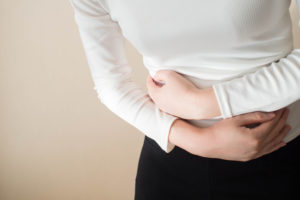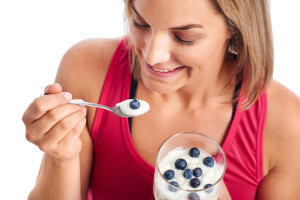
Ovarian cysts are fluid-filled sacs—like any cyst that can form anywhere in our body. They can be found in the ovaries or on their surface. They are usually harmless and are not treated with medication as they go away on their own.
Most common types of cysts:
Follicle Cysts: Formed during ovulation, as ovaries prepare to release the egg; the egg grows inside a follicle, which is a tiny sac. When the egg is ready, the follicle opens to release it. However, if the follicle doesn’t break open, then it continues to grow and becomes a follicle cyst.
Corpus Luteum Cysts: After a follicle has released the egg, it usually shrinks back to its normal size and produces hormones for the next menstrual cycle. At this stage, it’s a mass of cells called corpus luteum. It is possible that the corpus luteum will not shrink once it releases the egg, in which case it builds up fluid and becomes a cyst.
Polycystic Ovary Syndrome: This occurs when there are many small cysts found on the ovaries, which can potentially cause problems with getting pregnant.
Cystadenomas: Formed on the surface of an ovary and may be filled with a watery or mucous fluid; they can sometimes become large.
What causes them?
Hormonal Problems: Most cysts form as a result of the menstruation cycle, and they go away on their own after 1-3 months, or in the case of corpus luteum cysts after a few weeks. If you have hormonal problems or use drugs for ovulation, these may cause more ovarian cysts to appear.
Endometriosis: Endometriomas can form as a result of endometriosis, which is a condition causing uterine endometrial cells to form outside the uterus. In this case, the tissue can attach to the ovaries and form a growth.
Pelvic Infection: Severe pelvic infections can spread to the ovaries and fallopian tubes and create cysts.
Pregnancy: Dermoid cysts come from cells present at pregnancy called embryonic cells. They can sometimes contain skin, hair, or teeth and are also called teratomas. However, they are rarely cancerous.
What are the symptoms?
Most ovarian cysts do not create any noticeable symptoms, especially since they form as part of the normal menstrual cycle. However, large ovarian cysts or a cyst that has ruptured may cause:
- Pelvic pain
- Bloating
- Heaviness in your abdomen
- Sudden, severe pain
- Nausea and vomiting
- Pain during menstruation and/or during sex
- Unusual vaginal bleeding
- Needing to urinate more often
More
 New and updated birth control methods seem to be on the rise, so it can be easy to get overwhelmed by the number of choices. When considering your birth control options, it is important to be educated on the numerous options, such as how they fit your lifestyle as well as their benefits and risks.
New and updated birth control methods seem to be on the rise, so it can be easy to get overwhelmed by the number of choices. When considering your birth control options, it is important to be educated on the numerous options, such as how they fit your lifestyle as well as their benefits and risks.
Birth Control Pill
Hormonal birth control prevents pregnancy with a combination of hormones, progesterone, and estrogen that stop ovulation and thicken the cervical mucus to prevent fertilization. It is only available by prescription and must be taken on a daily basis. With correct use, the pill is 99% effective. With actual usage, the pill’s effectiveness is about 91%. The pill’s effectiveness lowers with improper use (not taken every day), the antibiotic Rifampin, the antifungal Griseofulvin, some anti-seizure medicines, and the herb St. John’s Wort.
One key risk of the birth control pill is that it does not protect against sexually transmitted infections, necessitating the use of a condom. Additional potential health risks include blood clots, breast cancer, intermenstrual spotting, nausea, breast tenderness, headaches and migraine, weight gain, mood changes, missed periods, decreased libido, vaginal discharge, and changes to eyesight for contact lens wearers.
Condoms
Condoms are the most commonly used barrier method of contraception in which a physical boundary prevents sperm from entering the uterus and are available over the counter. They contain a reservoir tip to contain ejaculation. Condoms prevent against both pregnancy and sexually transmitted infections, especially HIV, gonorrhea, chlamydia, and trichomoniasis; they are also associated with a lower rate of cervical cancer, which is associated with HPV.
However, condoms are not 100% effective at either pregnancy or disease prevention. The success rate of condoms at pregnancy prevention is 14% to 15%. With typical use, the reduction in the transmission rates of syphilis, gonorrhea and chlamydia, and HIV are, respectively, 29%, 50%, 40%, and 85%. Additionally, some users are allergic to latex, the most commonly used condom material.
IUDs
An IUD is an Intrauterine Device; it is a tiny, T-shaped polyethylene device that is inserted into the uterus and prevents pregnancy by releasing hormones (same as the birth control pill), preventing sperm from traveling to the egg, keeps the fertilized egg from traveling to the uterus, and prevents a fertilized egg by implanting into the uterine wall. IUDs are 99% effective at preventing pregnancy. IUDs can be used for anywhere from 3 to 10 years, depending on the type.
Additionally, they are mostly hassle-free once inserted; users do not have to take a daily pill or use a condom with each instance of intercourse. Like hormonal birth control pills, IUDs do not prevent sexually transmitted infections. Also, some IUDs may make periods heavier and cramping worse. While pregnancy with an inserted IUD is very unlikely, it raises the risk for miscarriage, infection, ectopic pregnancy, and early labor and delivery. IUDs also can cause ovarian cysts and pelvic inflammatory disease.
More
 Over the past few years, probiotic has certainly become a buzz word in the world of women’s health. Many different types of probiotics, with various claims to improve your overall health, are lined up on the shelves of your local pharmacy and grocery stores – and targeted to you through ads on google or Amazon.com. With all this excitement over probiotics, you may be thinking; do I need to take a probiotic supplement?
Over the past few years, probiotic has certainly become a buzz word in the world of women’s health. Many different types of probiotics, with various claims to improve your overall health, are lined up on the shelves of your local pharmacy and grocery stores – and targeted to you through ads on google or Amazon.com. With all this excitement over probiotics, you may be thinking; do I need to take a probiotic supplement?
First things first, what are probiotics?
Probiotics are live bacteria which are like the beneficial microorganisms naturally found in the human gut. They help you to digest food, produce vitamins and destroy bad microorganisms which can be detrimental to your health. A healthy balance between good and bad bacteria is essential to digestive health and your immune system.
What are the benefits of probiotics?
- Probiotics may help support a healthy immune system. Since roughly 70% of the body’s immune system resides in the walls of your gut, it’s important to keep it healthy. Ingesting probiotics may help protect against infection, including the common cold and the flu.
- Probiotics may help support weight loss. Recent studies have found a link between probiotics and body weight. The idea is that probiotics help the body break down and digest fiber. Taking the supplements alone will not result in weight loss. Some people decide to pair probiotics with cutting calories and increasing exercise to maximize weight loss efforts.
- Probiotics may help your gut recover after taking antibiotics. If you’ve ever taken a course of antibiotics and wound up with diarrhea or a yeast infection, it’s because the antibiotics destroyed the good and the bad bacteria, throwing your digestive system off kilter. Taking a probiotic supplement may help to ease side effects of antibiotics.
- Speaking of bathroom issues, probiotics may help prevent travelers’ diarrhea. Taking probiotic supplements that contain Lactobacillus acidophilus, Lactobacillus sporogenes, Bifidophilus bifidum, or Sacchromyces boulardii when traveling may help prevent bathroom emergencies.
- Probiotics may improve your skin. Probiotics may help treat common skin issues and improve eczema and psoriasis. Probiotics may also contribute to healthier skin by defending against wrinkles, sun damage, and dryness.
- Probiotics may support a healthy feminine flora. Lactobacilli (good bacteria) protect your vagina. If your good bacteria is compromised you may experience conditions such as a yeast infection or bacterial vaginosis. Some types of probiotics help control common feminine issues. Microbes can help keep the vaginal area acidic, creating a hostile environment to infectious bacteria.
Should you take a probiotic supplement?
Not necessarily! The most beneficial probiotic bacteria are called Lactobacillus and Bifidobacteria and you don’t need to get them from probiotic supplements. In fact, dietary sources of probiotics include types of yogurt, cheese and other dairy products should be sufficient enough to support a healthy gut.
What foods are high in naturally occurring probiotics?
- Yogurt is an excellent source of probiotics. Check for the “Live and Active Cultures” seal on the product label.
- Cheese can also include a good amount of probiotics. Goat milk, sheep milk and soft cow milk varieties of cheese typically include vast amounts of probiotics.
- Apple cider vinegar is made from fermented apple juice. Many fermented foods are high in probiotics.
- Unpasteurized kimchi and sauerkraut also contain probiotics because they are made in a fermentation process.
- Kombucha, a trendy tea drink, uses fermented black or green tea. The process of fermenting the tea adds bacteria and yeast, which account for the probiotics.
Scientists are still studying the benefits of probiotics and how much you’re really getting from supplements. Therefore, you may not need a supplement if you get enough “good bacteria” in your natural diet.
And remember, while probiotics may help the conditions mentioned above, proceed with caution and talk to your doctor if you have any of the following issues:
- A weakened immune system or get infections often.
- Food allergies or sensitivities, especially to dairy.
- If you are taking antibiotics that affect your immune system.
Still wondering if you should take a probiotic supplement? Talk to your doctor.
More



